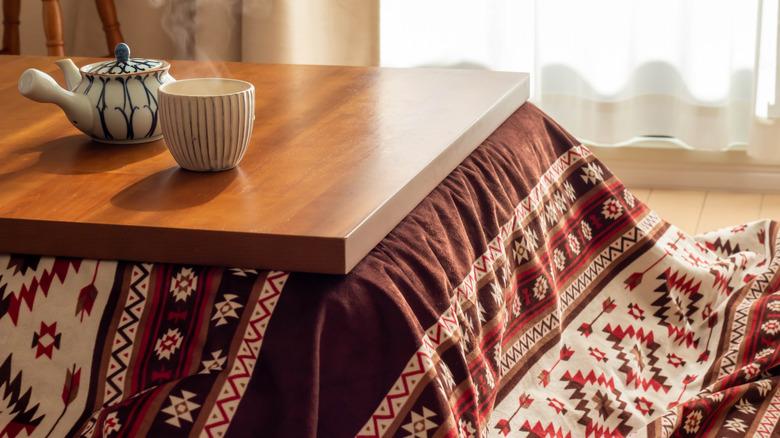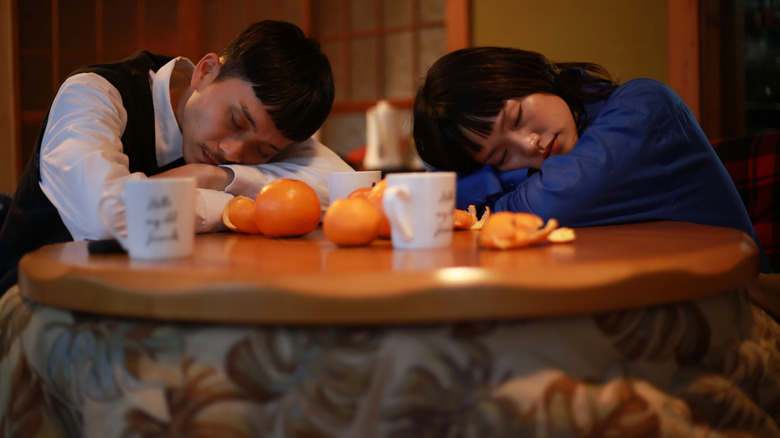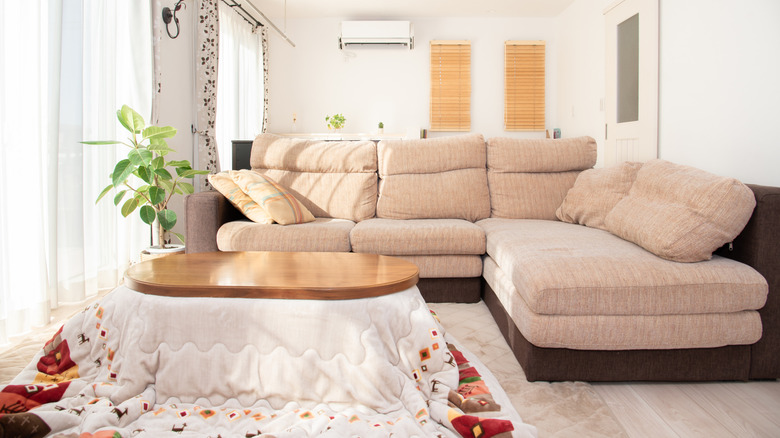The Japanese Home Practice For Warmer Winter Nights And If It's Safe
If you are tired of being cold in your home and have tried all the hacks for a warmer home in the winter, you might be interested to learn about the Japanese kotatsu, a warm and cozy winter bedding solution. A kotatsu is a combination of a heated table and a thick blanket. The warmth from the low table gets caught under the blanket, and to use it, you simply tuck your legs under the blanket and bask in the warmth. The kotatsu is common in buildings in Japan that lack central heating, especially in areas where you will sleep. While the toasty table may sound like a great solution, you may also find yourself wondering how safe a heater and blanket combination can be. There can be some danger in using the kotatsu for too long, but, for the most part, kotatsu are quite safe.
Kotatsu can be traced back to the 14th century, though current models are quite different. Originally, kotatsu were tables built up over hearths to capture the heat. Over time, the design improved to more effectively provide a heat source for people to use during the cold winter months. The latest versions of kotatsu are portable, electric, and filled with safety features, including ones meant to prevent overheating. For example, modern kotatsu will turn off automatically after a period of time. Despite these features, people understandably wonder about the safety of using a kotatsu, whether that is in their own home or while traveling.
Is it safe to use a kotatsu?
You may have fire hazard concerns about the blanket fabric being near a heat source. Kotatsu heaters typically reach temperatures between 80 and 95 degrees Fahrenheit, but some models can reach up to 140 degrees Fahrenheit. Despite the temperatures, the main fire risks come from overheating and electrical problems. To reduce risk, you should not leave a kotatsu on unattended. Many are built with automatic shut-off features and emit only low heat to prevent overheating. Regularly checking the electrical elements for damage and avoiding use if there are any issues will also help prevent fires. Be careful with any liquids near the kotatsu, as spills can damage the electric components, and use only kotatsu-specific blankets designed to tolerate the heat.
Aside from fire risks, you may wonder if there are negative health effects from using a kotatsu. If used for too long, low temperature burns and dehydration can become risks, particularly if you fall asleep under the kotatsu. Low temperature burns can occur after hours of contact with a mild heat source with a temperature between about 111 and 124 degrees Fahrenheit. These burns can result in drying, blisters, or damage deeper in the skin. However, typical kotatsu do not reach the required temperatures for a low temperature burn, and normal use will not involve direct contact with the heating source. Excessive sweating from the heat can cause dehydration that makes you sick, but many kotatsu turn off automatically before your health would be compromised. So while you should try not to fall asleep under a kotatsu, the health risks are fairly low.
Should you try out a kotatsu?
Whether you try out a kotatsu in Japan or are looking to bring one into your own home, they are a great alternative to electric radiators and space heaters for staying toasty in the winter. Not only can they safely keep you warm, but they can also add a soft, comfortable element to any room. The quilt looks extremely cozy in any space, and the patterns and colors of the quilt and wooden tabletop add character to a room. If you do want to purchase one for your own home, kotatsu can be quite pricey. You will need a rug for underneath the kotatsu, the table, the heating element, and the quilt or blanket. Prices vary widely depending on how and where you are making your purchase, but the cost will likely be at least several hundred dollars. Also, if you want one for your home and you do not live in Japan, you will need to exercise caution and probably use a voltage adapter to ensure safety, depending on your area's electricity.
Overall, kotatsu are portable, energy efficient, and generally safe. Just like a space heater, heated blanket, or heating pad, you should make sure to limit your exposure to the heat source and check the electrical components for any issues before using them to prevent fires. Whether you are looking to create a Japanese-inspired space in your home or find a new heating solution, a kotatsu is a wonderful choice.


